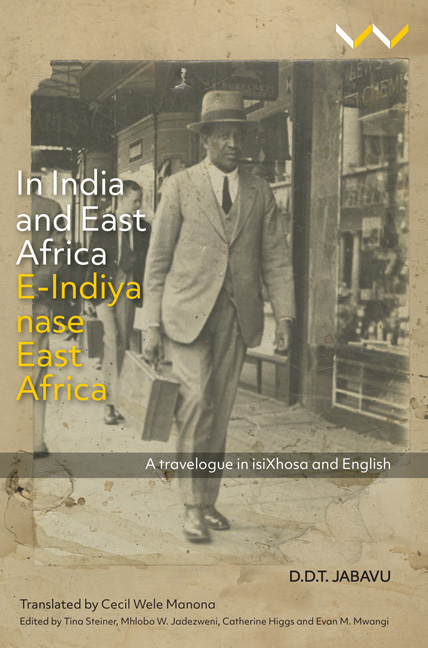Book contents
- Frontmatter
- Contents
- List of Illustrations
- Maps
- Acknowledgements
- Networks of Solidarity: D.D.T. Jabavu’s Voyage to India
- Revisiting D.D.T. Jabavu, 1885–1959
- Notes on the Original and the Translation
- In Praise of Cecil Wele Manona, 1937–2013
- E-Indiya nase East Africa
- In India and East Africa
- Afterword: Jabavu and African Translations for the Future
- References
- Editors’ Biographies
- Index
Chapter 2
Published online by Cambridge University Press: 27 March 2020
- Frontmatter
- Contents
- List of Illustrations
- Maps
- Acknowledgements
- Networks of Solidarity: D.D.T. Jabavu’s Voyage to India
- Revisiting D.D.T. Jabavu, 1885–1959
- Notes on the Original and the Translation
- In Praise of Cecil Wele Manona, 1937–2013
- E-Indiya nase East Africa
- In India and East Africa
- Afterword: Jabavu and African Translations for the Future
- References
- Editors’ Biographies
- Index
Summary
At noon, we arrived in the enormous city of Calcutta, the biggest city in India (six million people) and the second-biggest to London in the British Empire. At the station, there are many platforms and train lines whose length is like that one to Bulawayo. The people are as many as ants and everywhere people are tired, because it is hot and some sleep as though they do not have homes and there are many beggars. Even at home I have not seen so many poor people. Indeed, a poor Indian in India is poorer than a poor African at home because he becomes very thin. We lift up our heads even when we are poor.
Reception
The committee which had invited us welcomed us warmly, and Christian gentlemen took our luggage and our names. Even the officers at the ticket office were happy to see us when they heard about ‘Pacifist Conference Delegates’! After resting, we were decorated with garlands and led to our cars. We saw the great Hooghly River, which runs next to this city and which is a tributary of the Ganges. It forms a delta like the Nile in Egypt. There were ships of every sort. The streets are as crowded as in Bombay. There are many animals here which draw carts and there may even be two or three pulling one cart. They move in between the motor cars, a fearful sight. Some animals were roaming around browsing on the pavements and there were cattle and goats. This is a crowded city. I also saw women carrying water jars on their heads as they do at home.
The houses have many storeys, like in Johannesburg, and there is just no space. We travelled a good distance and finally arrived at the prestigious premises of the Pacifist Organisations, which belong to Indians and whites. Here, we met delegates from Japan, America, China, England, France, Egypt, Ireland, Germany and Australia, etcetera who were attending the same conference. We rested for the day and in the morning, we proceeded to the place where the meeting was to be held. On Wednesday 30 November 1949, we boarded a train from Calcutta to Bolpur 90 miles away and by the time we got there we were many people, because other delegates joined us on the way.
- Type
- Chapter
- Information
- In India and East Africa / E-Indiya Nase East AfricaA Travelogue in isiXhosa and English, pp. 204 - 226Publisher: Wits University PressPrint publication year: 2019

